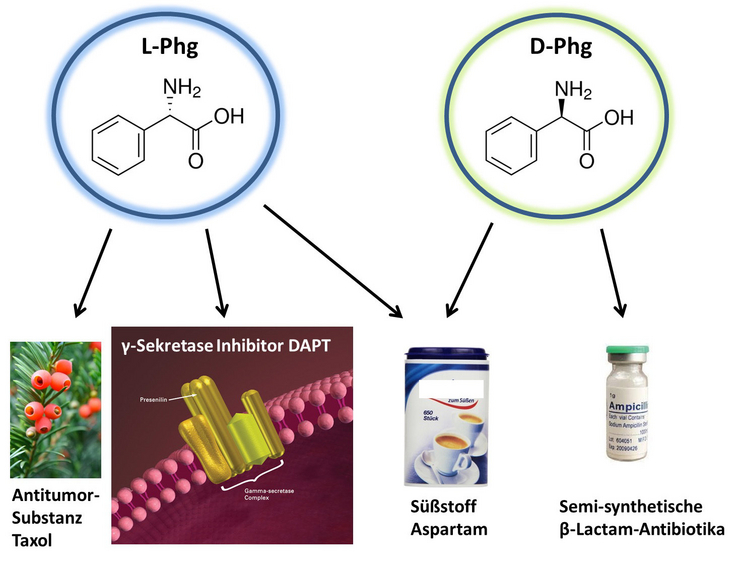A team led by Professor Yvonne Mast from the Leibniz Institute DSMZ-German Collection of Microorganisms and Cell Cultures GmbH in Braunschweig has succeeded in establishing a fermentative pathway for the production of D-phenylglycine - an important building block for products of the pharmaceutical industry. The researchers have now published their results in the internationally renowned journal Applied Microbiology and Biotechnology. The newly established synthesis pathway opens up the possibility of producing important building blocks for antibiotics, sweeteners or deodorants in an environmentally friendly and resource-saving way.
Phenylglycine - essential building block for the fine chemicals industry
Phenylglycine is a rare, non-proteinogenic amino acid and only occurs as a component of natural microbial substances such as certain antibiotics. In nature, the amino acid is produced as L-phenylglycine (L-Phg), but the stereoisomeric D-phenylglycine (D-Phg) is much more interesting for industrial use. Since D-Phg does not occur in nature it has to be produced by chemical synthesis. D-Phg is used as a building block for the production of numerous semisynthetic ß-lactam antibiotics such as ampicillin. At present, more than 5,000 tons of D-Phg are produced annually worldwide by conventional means. Petrochemical raw materials are used as starting materials and various chemicals and solvents are used for production.
Fermentative production of D-phenylglycine
In fermentative production, substances are produced by microorganisms. The advantages of fermentation are manifold: the starting materials are mostly renewable substances such as glucose and the end products have a high enantiomeric (optical) purity. For their experiments, Professor Mast and her team used Streptomyces pristinaespiralis, a bacterium belonging to the group of actinomycetes. This bacterium naturally produces the amino acid L-Phg as part of the antibiotic pristinamycin. Using a synthetic biology approach, the research group succeeded in modifying the natural L-Phg biosynthetic pathway from S. pristinaespiralis in such a way that the desired D-Phg is produced. The artificial biosynthetic pathway can now also be used for production in other host strains. "Although the production rates are still low," summarizes Yvonne Mast "we have not yet fully exploited the possibilities of genetic engineering and are currently exploring ways to increase the production rate. This is the only way to make the sustainable production of such versatile building blocks as D-phenylglycine really interesting for industry.”
Original publication:
Moosmann D, Mokeev V, Kulik A, Osipenkov N, Kocadinc S, Ort-Winklbauer R, Handel F, Hennrich O, Youn JW, Sprenger GA, Mast Y. Genetic engineering approaches for the fermentative production of phenylglycines. Appl Microbiol Biotechnol. 2020 Feb 20.
doi: 10.1007/s00253-020-10447-9. [Epub ahead of print]
Press contact:
Sven-David Müller, Head of Public Relations, Leibniz Institute DSMZ-German Collection of Microorganisms and Cell Cultures GmbH
Phone: ++49 (0)531/2616-300
Mail: Sven.David.Mueller(at)dsmz.de
About the Leibniz Institute DSMZ
The Leibniz Institute DSMZ-German Collection of Microorganisms and Cell Cultures is the world's most diverse collection of biological resources (bacteria, archaea, protists, yeasts, fun-gi, bacteriophages, plant viruses, genomic bacterial DNA as well as human and animal cell lines). Microorganisms and cell cultures are collected, investigated and archived at the DSMZ. As an institution of the Leibniz Association, the DSMZ with its extensive scientific services and biological resources has been a global partner for research, science and industry since 1969. The DSMZ is the first registered collection in Europe (Regulation (EU) No. 511/2014) and certified according to the quality standard ISO 9001:2015. As a patent depository, it offers the only possibility in Germany to deposit biological material in accordance with the requirements of the Budapest Treaty. In addition to scientific services, research is the second pillar of the DSMZ. The institute, located on the Science Campus Braunschweig-Süd, accommodates more than 73,000 cultures and biomaterials and has 198 employees. www.dsmz.de
The Leibniz Association
The Leibniz Association connects 96 independent research institutions that range in focus from the natural, engineering and environmental sciences via economics, spatial and social sciences to the humanities. Leibniz Institutes address issues of social, economic and ecological relevance. They conduct knowledge-driven and applied basic research, maintain scientific infrastructure and provide research-based services. The Leibniz Association identifies focus areas for knowledge transfer to policy-makers, academia, business and the public. Leibniz institutions collaborate intensively with universities – in the form of “Leibniz ScienceCampi” (thematic
partnerships between university and non-university research institutes), for example – as well as with industry and other partners at home and abroad. They are subject to an independent evaluation procedure that is unparalleled in its transparency. Due to the importance of the institutions for the country as a whole, they are funded jointly by the Federation and the Länder, employing some 19,100 individuals, including 9,900 researchers. The entire budget of all the institutes is approximately 1.9 billion Euros. www.leibniz-gemeinschaft.de


